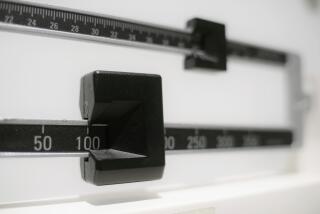Exercising by the Clock May Help Results
Early birds say morning workouts rev them up to face the day. But fans of afternoon or evening exercise say their workout time is a chance to forget the dayâs frustrations.
Is there really a prime time for exercise? It depends on your exercise goals, your lifestyle, job and family demands.
Your body reacts differently to exercise at varying times--with certain strengths and weaknesses tied to the clock.
In general, morning exercise is easier on your lungs, especially on smoggy days, but generally you are not as flexible.
Later in the day, you have higher capacities for both aerobic (endurance-type) exercise and anaerobic (sprint-type) exercise, says David W. Hill, an assistant professor of kinesiology at the University of North Texas, Denton, based on his comparison studies recently published in the Canadian Journal of Sport Science.
You are also likely to exhibit better performance in the afternoon, Hill has found. âIf someone says, âI want to do my best (performance or speed-wise),â you would have to say to do it in the afternoon. Sports performance increases as you go from morning to afternoon.â
Try afternoon exercise if you are working out to lose weight, some studies suggest. Thatâs because your body temperature rises in the afternoon, and, in turn, your rate of metabolism goes up, says Peter Raven, a professor of physiology at the Texas College of Osteopathic Medicine, Ft. Worth. âThe peak body temperature is at about 4-6 p.m.â
If you really want to shed pounds, exercise right before dinner, says John Duncan, an exercise physiologist and associate director of the Cooper Institute for Aerobics Research in Dallas. âThe exercise can act as an appetite suppressant,â he says. Eating less at dinner might, in turn, help control weight, says Duncan, citing one study in which those who ate the heaviest meal at dinner gained more weight than those who ate the most calories at breakfast or lunch.
If youâre exercising to improve fitness, the time of day matters little, says Duncan. âYou will improve regardless.â
If youâre training for a competitive event and are aiming to win, the best time to exercise is at the same time as the scheduled event, experts concur.
But if you want to stay faithful to your exercise routine, pick mornings. Early birds are most likely to follow a regular exercise routine. Experts credit that fact to human nature: As the day wears on, there are dozens of excuses to skip exercise.
Some people shy away from morning workouts, fearful of research suggesting heart attacks are more likely to occur before noon. In healthy people, there seems to be no increased risk of heart attack with morning-versus-afternoon exercise, says Duncan, citing a review of the medical literature presented at a 1992 symposium. The benefits of exercise can outweigh the risks, he adds.
âSedentary people are twice as likely as physically fit to die from a variety of causes,â he says, cautioning even healthy people to get a doctorâs OK before exercising.
Statistically speaking, the risk of a heart attack is greater in the morning, says Dr. Paul D. Thompson, director of preventive cardiology at the University of Pittsburgh Heart Institute, but that fact should not necessarily dissuade people from morning exercise.
âThe point is, the absolute death rate during exercise is extremely low,â says Thompson.
In a recent large-scale study, he compared the death rate during jogging with the death rate during sedentary activities. âIndeed,â he found, âyou are more likely to die during exercise (than inactivity). If you are exercising when your (cardiac) problem happens, you are more likely to die during the exercise.â
Even so, that risk is low, âIf you are healthy, your chance of dying during exercise is extremely low,â he says. âIf youâve got coronary artery disease, exercise is more dangerous. But the bottom line is, itâs probably more important to be active than it is to worry about a minuscule increase in your risk if you exercise in the morning versus the evening.â
He advises heart patients to discuss their exercise plans in detail with their cardiologist.
If a heart patient could be equally adherent to a morning or evening exercise routine, Thompson says he would advise an afternoon program.
âBut for most people, getting it done early in the day invigorates them, makes them feel like they have accomplished something. . . .â The real perfect time to exercise, Thompson says, is âwhenever you can.â
Agrees Hill: âThe best time to exercise is the time you are actually going to do it. If youâre an athlete, you can schedule your training around physiology. Otherwise, you are going to end up fitting it in when you can.â
You are more likely to stick with exercise if you schedule sessions as faithfully as business meetings, says John Reitano, an exercise physiologist at FHP, a health maintenance organization in Van Nuys. âAt the beginning of each week, take out your planner and map out when you will exercise,â he suggests.
âWhen you formally schedule a time, youâre saying, âI value myself. Iâm making myself and exercise a priority.â â




